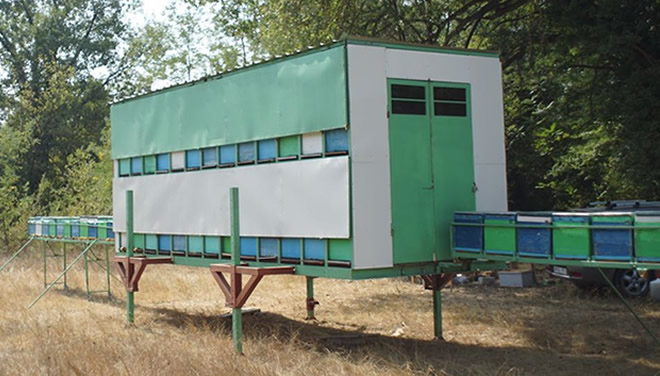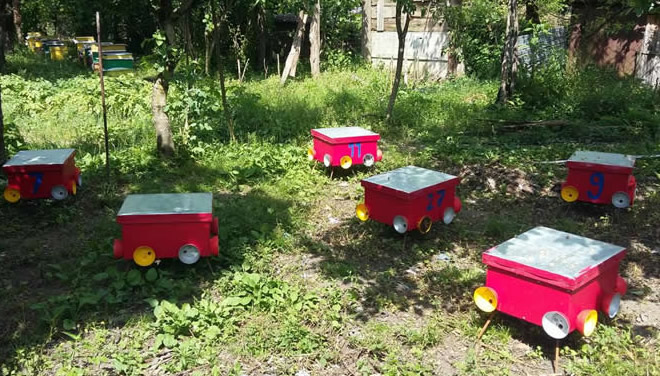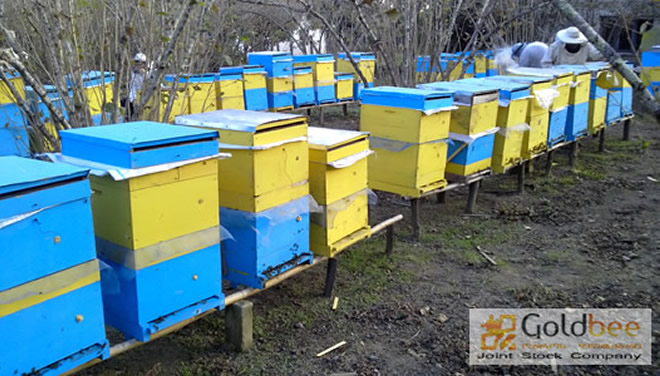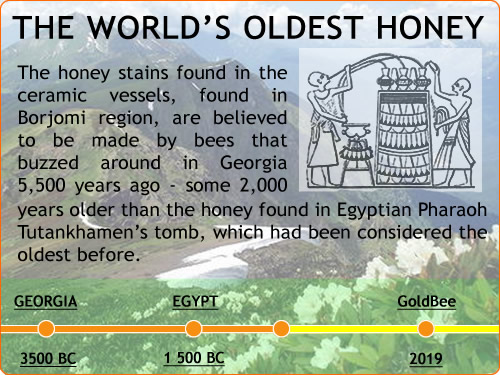
 Our mission is to support beekeeping globally, in any region of the world and offer pure line Caucasian queen bees (Apis mellifera caucasica) for any interested companies or individuals directly from their motherland - Georgia. Caucasian bees are the most gentle bees species in the world, they are winder-hardy and very productive, thanks to longest tongue and ability to fly in cool temperatures and even in light rain, that other races of bees will not dare. With all these characteristics the Caucasian bees are probably the best bees on the market today. The problem is that pure breed Caucasian honey bees are rare even in Georgia, as well as in other countries. Exported bees over the decades lost many of their standards characteristics due to the homogenization. Hybrid species also became distinct from autochthonous Caucasian bees. After the collapse of Soviet Union and several military conflicts in Georgia, bee breeding became difficult in the country, but thanks to our researchers pure Caucasian bees were saved and preserved in special apiaries supported by Government and few beekeeping companies. At GOLDBEE we tried to do our best to maintain pure Caucasian bees and still continue preservation and breeding. Our quality control service assures that all exported queen bees are specially selected from breeding stock, maintaining blood lines to assure highest quality available. For almost 6 millennium Caucasian bees proved their ability and today they are considered as one of the best choice for many beekeepers in the world. Hope our queen bees will greatly boost your production and strengthen your colonies.
Our mission is to support beekeeping globally, in any region of the world and offer pure line Caucasian queen bees (Apis mellifera caucasica) for any interested companies or individuals directly from their motherland - Georgia. Caucasian bees are the most gentle bees species in the world, they are winder-hardy and very productive, thanks to longest tongue and ability to fly in cool temperatures and even in light rain, that other races of bees will not dare. With all these characteristics the Caucasian bees are probably the best bees on the market today. The problem is that pure breed Caucasian honey bees are rare even in Georgia, as well as in other countries. Exported bees over the decades lost many of their standards characteristics due to the homogenization. Hybrid species also became distinct from autochthonous Caucasian bees. After the collapse of Soviet Union and several military conflicts in Georgia, bee breeding became difficult in the country, but thanks to our researchers pure Caucasian bees were saved and preserved in special apiaries supported by Government and few beekeeping companies. At GOLDBEE we tried to do our best to maintain pure Caucasian bees and still continue preservation and breeding. Our quality control service assures that all exported queen bees are specially selected from breeding stock, maintaining blood lines to assure highest quality available. For almost 6 millennium Caucasian bees proved their ability and today they are considered as one of the best choice for many beekeepers in the world. Hope our queen bees will greatly boost your production and strengthen your colonies.




Georgia has a long history of beekeeping. So far, the oldest remains of honey in the world have been found in Georgia, Borjomi region. Archaeologists have found honey remains on the inner surface of clay vessels unearthed in ancient tomb, dating back some 5,500 years. The oldest honey before that finding was considered honey found in Egyptian Pharaoh Tutankhamen's tomb (1500 BCE). Based on the Archaeological excavation Georgian honey is some 2000 years older than Egyptian one and is considered as oldest honey in the world.
The honey vessels and other artifacts were found in the tomb of an apparent female noblewoman, which was discovered in 2003 during the construction of the Baku-Tbilisi-Ceyhan oil pipeline.




Communist revolution in Russia and occupation of Georgia by the Soviet Union in 1921 led to the country isolation. Georgian honeybee was studied and cultivated primarily by Soviet entomologists. The scientists were amazed by its ability to out-produce other bee types, even in non-native habitats, and by its long tongue, or proboscis. A Soviet-era report found that honey production by Georgia’s Caucasus bees exceeded that of the Russian Krasnopoliansk bee by 30 to 40 percent, rendering a sweet total of 25 to 30 kilograms of honey per season. Soviet officials were so concerned about preserving the purity of this Caucasian species that they outlawed any transport of Caucasus bee colonies without special permission.
 3 gold medal awards started a new era of popularization of Georgian grey honeybees.
First Gold Medal was given to the Georgian honeybee in 1961, at the International Exhibition of Gardening in Erfurt (Germany), next time, the Georgian honeybee was awarded a Gold Medal at the jubilee celebration of the APIMONDIA 20th International Congress of Agriculture in Bucharest (Romania) in 1965, and the third Gold Medal was received at the jubilee celebration of the APIMONDIA 23th International Congress of Agriculture in Moscow in 1971.
3 gold medal awards started a new era of popularization of Georgian grey honeybees.
First Gold Medal was given to the Georgian honeybee in 1961, at the International Exhibition of Gardening in Erfurt (Germany), next time, the Georgian honeybee was awarded a Gold Medal at the jubilee celebration of the APIMONDIA 20th International Congress of Agriculture in Bucharest (Romania) in 1965, and the third Gold Medal was received at the jubilee celebration of the APIMONDIA 23th International Congress of Agriculture in Moscow in 1971.
According to Sunday Mirror a newspaper published in UK:
"GOLDEN BEE the grey mountain bee of the Soviet Union has been judged the best in the world and awarded a gold medal. The grey caucasian bee is distinguished for its industry and it collects honey, even when it is raining. Many foreign beemasters have requested for the Golden bee and as many as 200 000 have been sent to Europe, Asia and America this year." (Sunday Mirror June, 1 1969)
Pure-strain Caucasian grey mountain queen bees were spread in more than 40 countries of the world, including: Germany, France, Switzerland, Poland, Belgium, USA, Austria, Australia, India, Brazil, Japan, England, Bulgaria, Cuba, Finland, Algeria and etc.
After the collapse of the Soviet Union, Georgia regained its independence in 1991. USSR disintegration process and a series of military conflicts in Georgia hindered the breeding as well the exportvprocess greatly. From 2000s Georgian entomologists and beekeepers started revival of apiculture in the country. An export of Caucasian queenbees, honey & hive products slowly renewed mainly to Turkey and CIS countries.
We at GOLDBEE are determined to develop and support beekeeping in Georgia and offer to our customers abroad pure strain Caucasian queen bees. We are in position to export queen bees to any interested companies or individuals in the world and support governmental beekeeping programs in different countires.